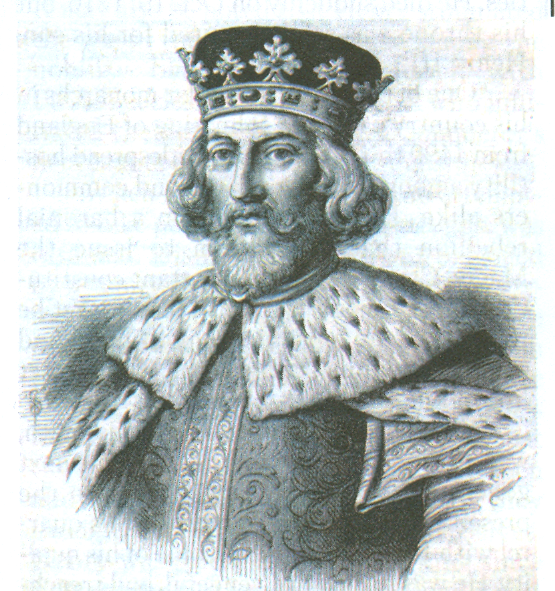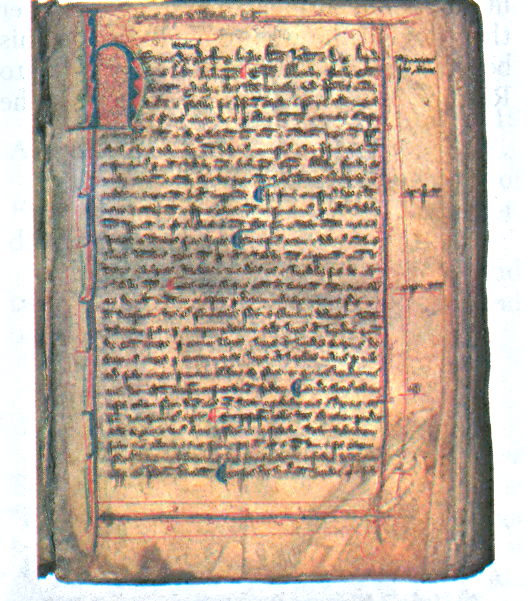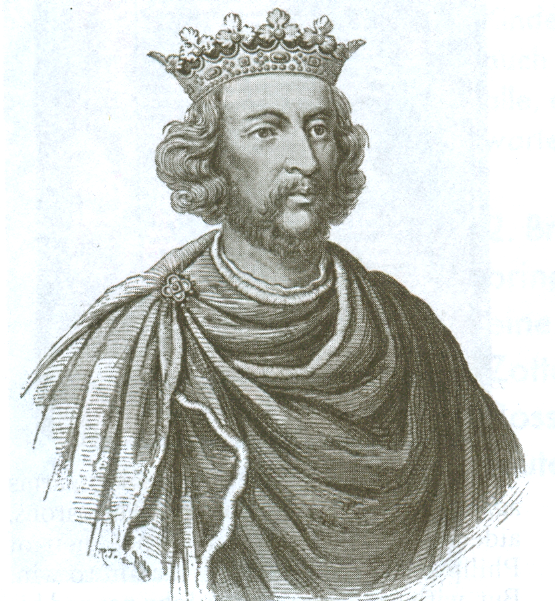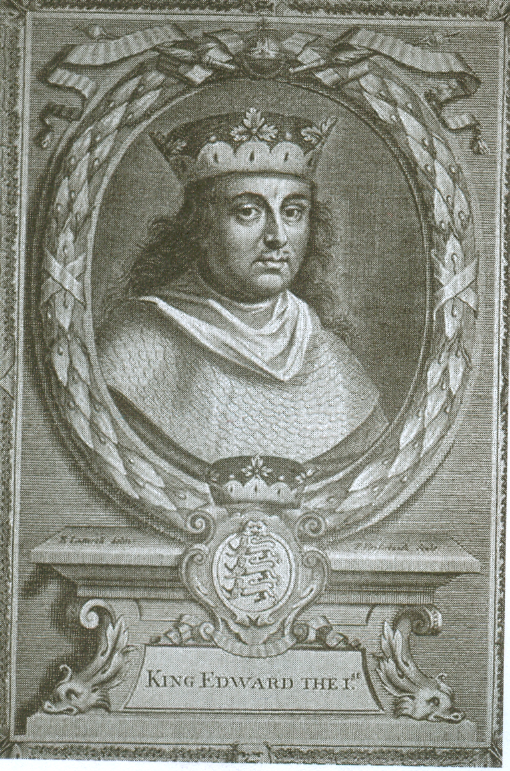
J ohn
the Lackland. When
King John ruled England, he showed no interest at all in anyone’s
rights. He didn’t even treat the nobles very well! He thought that
nobles were becoming too powerful. Noblemen were angry. In 1213 a
group of powerful men met in England. They drew up a list of rights
that they wanted the king to grant them. But King John didn’t want
to give up any of his power. He refused to sign the list. In 1215 the
nobles sent an army after him. King john saw that he couldn’t
defeat the army, so he finally gave in. at Runnymede, on the banks of
the Thames River, King John signed the list of rights. It became
known as the Great Charter or the Magna Carta.
ohn
the Lackland. When
King John ruled England, he showed no interest at all in anyone’s
rights. He didn’t even treat the nobles very well! He thought that
nobles were becoming too powerful. Noblemen were angry. In 1213 a
group of powerful men met in England. They drew up a list of rights
that they wanted the king to grant them. But King John didn’t want
to give up any of his power. He refused to sign the list. In 1215 the
nobles sent an army after him. King john saw that he couldn’t
defeat the army, so he finally gave in. at Runnymede, on the banks of
the Thames River, King John signed the list of rights. It became
known as the Great Charter or the Magna Carta.
The Magna Carta listed 63 demands. These rights led the way toward English democracy. The Magna Carta said that:
a freeman had to be tried by a jury of his equals before he could be sent to prison.
Taxes would be collected by legal means, not by force.
Justice would not be denied to freemen.
The Magna Carta did not bring instant democracy to England. It really gave more privileges and rights to the nobles. All men were still far from equal. But it did limit the power of the king. Now a king or queen could not simply go ahead and order new taxes. He or she first had to bring the matter before a council of nobles. That council was called the Great Council. Also the Magna Carta set a basis for the modern jury system.

Magna Carta.
Task 1. Answer the questions.
Did the nobles like King John?
What important event take place in 1215?
Why didn’t the king want to sign the list? Why did the king have to sign the list?
How was the list of rights called?
How many demands did the Magna Carta list?
What main points were there in the list?
Under the Magna Carta, what happened to a person accused of a crime?
Why was the Magna Carta so important to England?
Did the Magna Carta bring instant democracy to all English people?
Task 2. Find the right answer.
1. The king sighed the list of rights. What was his name?
king John
king Charles
king Edward
2.The list of rights was known as
the Magna Carta
the Great Council
the Great List of Rights
3.The rights led toward
English industry
English democracy
English justice
4.The council of nobles was known as
the Magna Carta
the Great Council
the Round Table of nobles
5. King John sealed
- the Domesday Book
- Magna Carta
- a peace treaty with France
6. John lost almost all English possessions in France hence his nickname---
- the Lionheart
- Lackland
- the Black Prince
7. What year was the Magna Carta signed by King John at Runnymede?
- 1215
- 1915
- 1512
- 1216
Task 3. The document sounds neutral, make it more categorical.
Magna Carta (1215).
Example: The King can’t take taxes without asking the barons and the Church first - The King should not take taxes without asking the barons and the Church first.
Everyone will have to obey the law, even the monarch.
Freemen can’t be punished without a fair trial in court.
The King can’t tell the Church what to do.
The King’s men can’t take away the freedom and the property of freemen and merchants.
The King will have to follow the advice of his barons.
H enry
3. King
John was succeeded by his son Henry III (1216-1272). He was not as
bad as his father but he was continually short of money and
extravagant by nature.
enry
3. King
John was succeeded by his son Henry III (1216-1272). He was not as
bad as his father but he was continually short of money and
extravagant by nature.
Henry III faced a further development of baronial ambitions and protests. They accused the King of violating their rights and liberties. After a very bad harvest in 1257 Henry III demanded a third of all English property. This aroused a new baronial riot. The barons finally came armed to the Parliament at Oxford and drew up «provisions» - «Oxford Provisions» and additional «Westminster provisions» - to protect the knights from barons which gave all the power in the country to barons. The King and his son did not want to become puppets; and as a result a military conflict developed.
The country was divided into supporters and enemies of the King and a Civil war broke out.
The army of barons was headed (led) by Earl Simon de Montfort and was at first successful in capturning the King's fortresses and castles. They were greeted by townsmen and students of Oxford and church bells.
In 1264 Earl Simon took the King prisoner for a year; the victory of his supporters at the Battle of Evesham restored him to the throne.
 Edward
1. He
was the first to create a “representative institution”. This
institution became the House of Commons. It contained a mixture of
“gentry” (knights and wealthy freemen from the shires) and
merchants from the towns. He commanded each shire and town to send
two representatives to his parliament. They were called “commoners”.
He made Wales a part of England. He united west Wales with England.
Edward
1. He
was the first to create a “representative institution”. This
institution became the House of Commons. It contained a mixture of
“gentry” (knights and wealthy freemen from the shires) and
merchants from the towns. He commanded each shire and town to send
two representatives to his parliament. They were called “commoners”.
He made Wales a part of England. He united west Wales with England.
Wales. The conquest of Wales took place during the beginning of Edward I's reign. The English kings had always claimed some sort of overlordship of Wales, but had never been able to conquer the people. The Welsh were very poor, and had no great possessions except flocks and herds that could easily be moved. When their country was invaded they usually fled to the mountains and harassed the invaders by means of their archers, who were exceptionally clever.
On the Welsh border, or «marches» great parts of country had been given to powerful Norman barons by William the Conqueror, so that they might be able to keep the Welsh in check. Sometimes, however, these barons rebelled against the king, and the Welsh helped them, so at all times the Welsh border was more or less in a stat of war. Matters came to a head when Llewelyn ap Gruffyd, prince of Gwynedd claimed to be independent lord of Wales. Edward I attacked Wales from the sea as well as from the land, and at last succeeded in conquest by starvation.
Thus in 1284 Edward united west Wales with England. But he did not interfere with the areas the Normans had conquered earlier on the English-Welsh border, because this could lead to trouble with his nobles. The Welsh needed a new prince, and at a public ceremony at Coronation Edward I made his own baby son (later Edward II – was born in a Welsh castle and “could spell not a word of English”) Prince of Wales. From that time the eldest son of the ruling king or queen has usually been made Prince of Wales.
